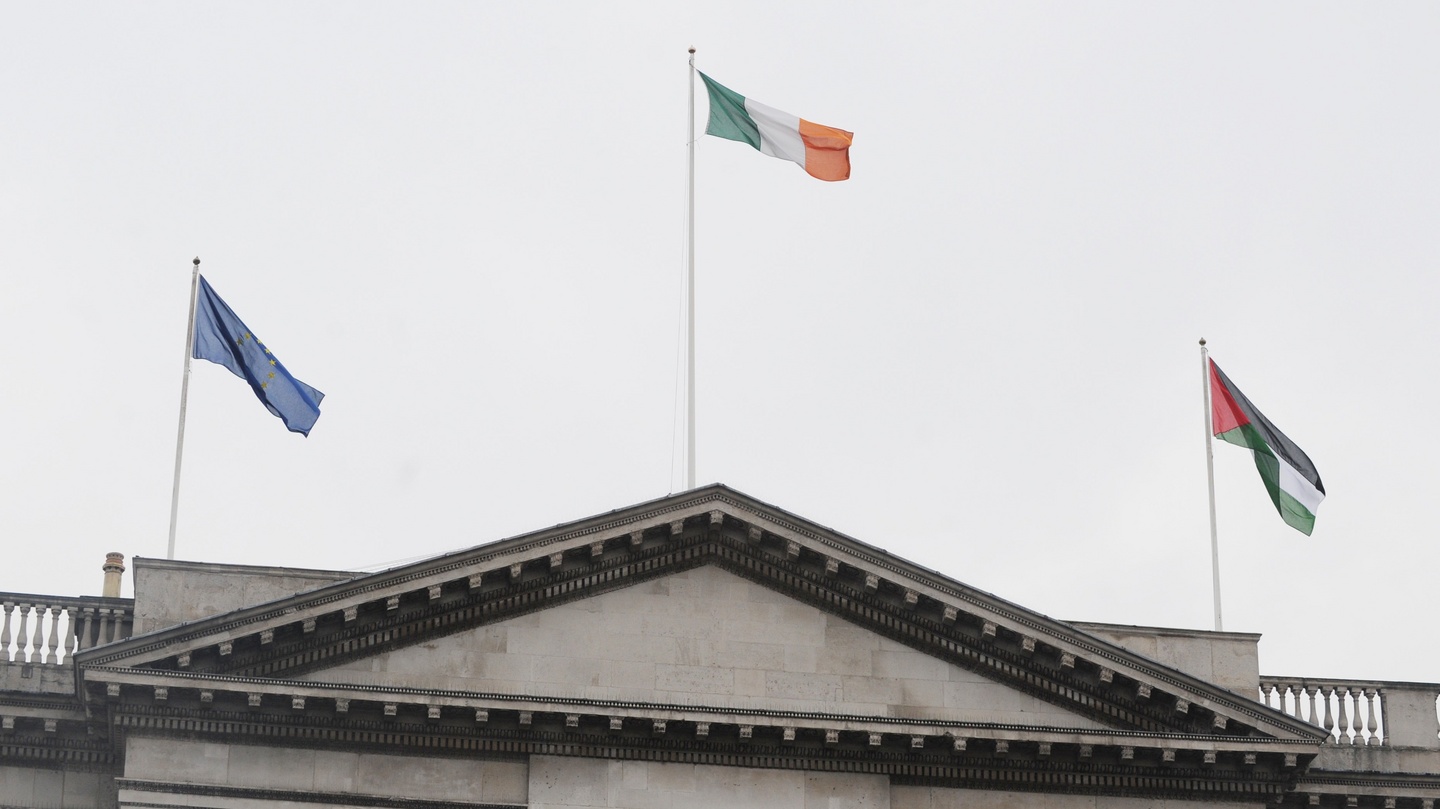Irish and Palestinian Independence: A United Struggle
By Ibrahim Fadel - May 2021

Dublin City Hall, 2017. Credits to The Irish Times
Ireland has faced British
colonialism for hundreds of years. From the Norman invasion, to the Cromwellian conquest, to The Troubles, their
fight against colonialism and ethnic cleansing has endured. Today, many parallels can be drawn between the
centuries long fight for independence in Ireland, and the ethnic cleansing and colonization of Palestine. The
establishment of plantations in Ireland, construction of Peace Walls, and the policies of the British government
during the Potato Famine bear striking similarities to the creation of Israeli settlements in the West Bank, the
erection of the West Bank Barrier, and the blockade on Gaza.
The colonization of Ireland began with the Norman invasion in 1169. They seized and claimed sovereignty over
large amounts of Irish land. Conflict continued for hundreds of years between the English and Irish. The Irish
resented British rule, as such, they revolted several times. Following the Desmond Rebellions and the Nine Years
War during the 16th century, British plantation began. Plantations in Ireland involved the seizure of native
land and the colonization of this land with British settlers. This practice was seen as a means to culturally
assimilate and ‘civilize’ the Irish, as well as to secure British control over the land.
The colonization of Palestine has been remarkably similar. In 1948, a paramilitary organization called the
Haganah depopulated and destroyed hundreds of villages, expelling over 700,000 Palestinians. In more recent
years, illegal settlements have propped up throughout Palestine, most notably in the West Bank. These
settlements are constructed in Palestinian territory, exclusively for their Jewish population, in an effort to
bring Palestinian land under Israeli sovereignty. These settlements, analogous to the plantations in Ireland,
resulted in the expulsion of Palestinians from their native land.
In the latter half of the 20th century, systematic Loyalist oppression and violence against the Civil Rights
Movement which called for an end to the discrimination of Catholics led to ‘The Troubles’ -- a series of
protests and riots. Ian Paisley, a Northern Ireland Loyalist, founded paramilitary forces; using them, he
undermined peaceful protests, and carried out mass evictions of Catholics. British soldiers were deployed to
respond to the violence, but ultimately committed atrocities themselves such as Bloody Sunday in which soldiers
fired on 26 Catholic civilians who were marching peacefully. Peace Walls were eventually constructed in order to
separate Catholic neighborhoods from Protestant neighborhoods and limit violence.
Much like the Irish, Palestinians have been protesting against occupation and ethnic cleansing for years. The
First Intifada (Uprising) was a series of protests and riots which took place during 1987 that called for the
end to Israeli occupation of Palestine. The IDF deployed tens of thousands of troops in order to suppress the
rebellion. The Second Intifada, or the Al-Aqsa Intifada, began in the year 2000, and was sparked by different
events, yet called for the same things. Again, the rebellion led to mass bloodshed. Following this rebellion in
2002, Israel began construction of their separating wall in the West Bank. This wall is a barrier between
Palestinians and Israelis which stretches beyond UN defined boundaries into Palestinian territory.
The Irish Potato Famine began in 1845 when a fungus-like organism called Phytophthora infestans spread
throughout Ireland wiping out up to half of their potato crop. Three-quarters of the crop would be ruined over
the next seven year. During such a famine, one might expect to halt the export of the little remaining food.
Exports, however, did not halt. The British government facilitated the export of more than 26 million bushels of
grain from Ireland to England in 1845, and these numbers would only increase as the famine progressed. In 1846,
the Irish successfully petitioned the British to repeal the Corn Laws and tariffs on grain which both made other
food items extremely expensive. A Relief Commission was also established in order in hopes of providing aid to
Irish people; however, then Prime Minister Lord John Russell almost immediately abolished it. Furthermore, Queen
Victoria famously blocked a significant Turkish donation from reaching the Irish. The British government was not
simply complicit in the death of Irish people, they were perpetrators who accelerated it.
In similar fashion, Gaza has been under an Israeli blockade since 2007. Israel’s military restricts Palestinians
from fishing further than 5.6 kilometers off shore, firing on anyone who goes beyond this mark. Israel controls
roughly half of Gaza’s electricity and routinely shuts it off; it’s fighter jets and drones regularly patrol the
airspace; their forces block humanitarian relief vessels from delivering supplies to Gazans and routinely block
the import of goods such as food and toys. The blockade of Gaza has been declared to be in violation of
international humanitarian law by many, including the International Committee of the Red Cross.
I’d like to conclude not just by emphasizing the similarities between the Irish and Palestinian fights for
independence, but also by highlighting their solidarity with one another. Many members of the Irish government
have voiced overwhelming support for the Palestinians. The Palestinian flag was even flown in Dublin city hall
for a month as a sign of solidarity. The Representative Office of Ireland in Ramallah manages a program for
development and humanitarian assistance in Palestine, and they regularly provide relief to Palestinians, despite
it often being destroyed by Israel. Both Ireland and Palestine have endured brutal policies enforced by foreign
settlers, repressive rule, and, of course, ethnic cleansing.
In light of recent events in Sheikh Jarrah, Jerusalem, and the Al-Aqsa mosque this Ramadan, I would like to
highlight that the Palestinian struggle is not unique: it is a story of ethnic cleansing, cultural assimilation,
and settler colonialism. It is a story known by not just the Palestinians, but also the Irish. The Irish fought
for hundreds of years to achieve independence, and I believe that the fight against settler colonialism will
prevail in Palestine as well.
